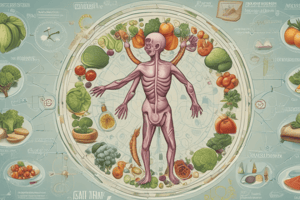Podcast
Questions and Answers
What is the primary purpose of using the scientific method in nutrition science?
What is the primary purpose of using the scientific method in nutrition science?
- To prove conventional beliefs and practices
- To design human studies without experimentation
- To conduct animal experiments only
- To discard conventional beliefs and practices that are not supported by evidence (correct)
What type of experiment is used to test a hypothesis in a controlled environment?
What type of experiment is used to test a hypothesis in a controlled environment?
- Animal observation
- Clinical trial
- Human research study
- Laboratory experiment (correct)
Why are animal experiments used in nutrition science?
Why are animal experiments used in nutrition science?
- To test the effect of a treatment on a specific species only
- To replace human studies entirely
- To establish safety and efficacy before conducting human studies (correct)
- To reduce costs associated with human research
What is the purpose of a placebo in an experimental study?
What is the purpose of a placebo in an experimental study?
Why are large sample sizes needed in human research?
Why are large sample sizes needed in human research?
What is the purpose of random assignment in experimental studies?
What is the purpose of random assignment in experimental studies?
What is the primary characteristic of a randomized controlled trial (RCT)?
What is the primary characteristic of a randomized controlled trial (RCT)?
What is the ultimate goal of using the scientific method in nutrition science?
What is the ultimate goal of using the scientific method in nutrition science?
What is a concern about many health-related apps available to college students?
What is a concern about many health-related apps available to college students?
What should you do when searching for recipes online?
What should you do when searching for recipes online?
What is a red flag indicating a questionable source of nutrition information?
What is a red flag indicating a questionable source of nutrition information?
What is a Registered Dietitian Nutritionist (RDN)?
What is a Registered Dietitian Nutritionist (RDN)?
What is required to become a Registered Dietitian Nutritionist (RDN)?
What is required to become a Registered Dietitian Nutritionist (RDN)?
Where can RDNs work?
Where can RDNs work?
What is a dietary supplement?
What is a dietary supplement?
What is conventional medicine?
What is conventional medicine?
Why may physicians not be the best sources of nutrition information?
Why may physicians not be the best sources of nutrition information?
What is the difference between a testimonial and an anecdote?
What is the difference between a testimonial and an anecdote?
How does the FDA regulate dietary supplements?
How does the FDA regulate dietary supplements?
What is a risk associated with using herbal supplements?
What is a risk associated with using herbal supplements?
Why is it important to consult a physician before using dietary supplements?
Why is it important to consult a physician before using dietary supplements?
What is a potential hazard of using dietary supplements?
What is a potential hazard of using dietary supplements?
What is a recommended source of information about dietary supplements?
What is a recommended source of information about dietary supplements?
What should you do if you experience negative side effects after using a supplement?
What should you do if you experience negative side effects after using a supplement?
Why is it important to consume phytochemicals in their natural forms?
Why is it important to consume phytochemicals in their natural forms?
What is a characteristic of the dietary supplement industry in the United States?
What is a characteristic of the dietary supplement industry in the United States?
Who should not take dietary supplements?
Who should not take dietary supplements?
What is a recommended alternative to taking dietary supplements?
What is a recommended alternative to taking dietary supplements?
What is the primary function of epidemiological studies?
What is the primary function of epidemiological studies?
What type of study involves following a group of people over time to identify factors that contribute to the development of a health condition?
What type of study involves following a group of people over time to identify factors that contribute to the development of a health condition?
What is the term for a negative response to a treatment due to expectation?
What is the term for a negative response to a treatment due to expectation?
What is the primary limitation of epidemiological studies?
What is the primary limitation of epidemiological studies?
What is the purpose of peer review in research?
What is the purpose of peer review in research?
What type of correlation occurs when two variables are associated with a third variable, rather than with each other?
What type of correlation occurs when two variables are associated with a third variable, rather than with each other?
What is an example of research bias?
What is an example of research bias?
Why may conflicting results occur in research studies?
Why may conflicting results occur in research studies?
What is the primary advantage of peer-reviewed articles?
What is the primary advantage of peer-reviewed articles?
What is a reason why there is so much nutrition misinformation?
What is a reason why there is so much nutrition misinformation?
What should you do when evaluating a product's effectiveness?
What should you do when evaluating a product's effectiveness?
What is a red flag to look out for when evaluating nutrition information?
What is a red flag to look out for when evaluating nutrition information?
What is a characteristic of a reliable online source of nutrition information?
What is a characteristic of a reliable online source of nutrition information?
What can you use to search for science-based published articles?
What can you use to search for science-based published articles?
What is a role of the Federal Trade Commission (FTC)?
What is a role of the Federal Trade Commission (FTC)?
What should you be cautious of when evaluating websites sponsored by nationally recognized health associations?
What should you be cautious of when evaluating websites sponsored by nationally recognized health associations?
What is a characteristic of a potentially misleading website?
What is a characteristic of a potentially misleading website?
Why should you use multiple sites when searching for nutrition information online?
Why should you use multiple sites when searching for nutrition information online?
What should you do when using mobile apps for health and nutrition?
What should you do when using mobile apps for health and nutrition?
Flashcards are hidden until you start studying
Study Notes
The Scientific Method in Nutrition
- The scientific method involves making observations, generating questions, developing a hypothesis, reviewing literature, designing an experiment, collecting and analyzing data, and drawing conclusions.
- Nutrition scientists use the scientific method to discard conventional beliefs and practices that are not supported by evidence.
Laboratory Experiments
- Laboratory experiments involve testing a hypothesis using a systematic approach.
- Animal experiments (in vivo) and cell-based experiments (in vitro) are used to test hypotheses.
- Animal experiments are used to establish safety and efficacy before conducting human studies.
Human Research: Experimental (Intervention) Studies
- Experimental studies involve randomly assigning human subjects to treatment and control groups.
- Randomized controlled trials (RCTs) are used to test hypotheses.
- Placebos are used to control for variables and ensure that the treatment is the cause of any observed effects.
Characteristics of Human Research
- Human research involves variability among subjects, which can affect the results of the study.
- Large sample sizes are needed to account for this variability.
- Random assignment helps to ensure that the treatment and control groups are similar.
Randomized Controlled Trials (RCTs)
- RCTs are used to test hypotheses in human research.
- Subjects are randomly assigned to treatment and control groups.
- Placebos are used to control variables.
Placebo and Nocebo Effects
- The placebo effect is a positive response to a treatment due to expectation.
- The nocebo effect is a negative response to a treatment due to expectation.
- Placebos can produce beneficial physiological and psychological changes.
Human Research: Epidemiological Studies
- Epidemiological studies involve the study of the occurrence, distribution, and causes of health problems in populations.
- These studies are used to identify factors that affect the health of a population.
- Data are collected from physical examinations, laboratory tests, and surveys.
Types of Epidemiological Studies
- Case-control studies compare individuals with a health condition (cases) to individuals without the condition (controls).
- Cohort studies involve following a group of people over time to identify factors that contribute to the development of a health condition.
Importance of Epidemiological Studies
- Epidemiological studies help to identify factors that contribute to the development of health problems.
- They inform public health policy and prevention strategies.
- They provide a basis for further research into the causes of health problems.
Epidemiology and Study Designs
- Epidemiology is the study of the distribution and determinants of health-related events or characteristics among populations.
- Epidemiological studies involve observing and analyzing large groups of people to identify patterns and correlations between variables and health outcomes.
Case-Control Study
- A case-control study involves matching people with a health condition (cases) with people who are healthy (controls) but have similar characteristics.
- The goal is to identify differences in exposures or behaviors between the two groups that may be associated with the development of the health condition.
Cohort Study
- A cohort study involves collecting and analyzing data on a large group of people over time.
- The study can be retrospective or prospective.
- Retrospective cohort study: collects data on past exposures and current health outcomes.
- Prospective cohort study: collects data on exposures at the beginning of the study and follows participants over time to record health outcomes.
Limitations of Epidemiological Studies
- Epidemiological studies cannot establish causation, only correlation.
- Correlation occurs when two variables change over the same period.
- Types of correlation: direct (positive), inverse (negative), and coincidental.
- Coincidental correlations occur when two variables are associated with a third variable, rather than with each other.
Analyzing Data and Drawing Conclusions
- Nutrition researchers use statistical methods to analyze data and identify relationships between variables and health outcomes.
- Researchers must avoid research bias and report results objectively and honestly.
- Peer review is a critical analysis of research conducted by experts in the field to ensure the study was well-conducted and the results are fairly represented.
Research Bias
- Research bias occurs when funding sources or personal attitudes influence the results of a study.
- Examples of research bias: the beef industry funding studies that support the benefits of beef consumption, or the sugar industry influencing research to downplay the role of sugar in heart disease.
Peer-Reviewed Articles
- Peer-reviewed articles are published in scientific journals and have undergone critical analysis by experts in the field.
- Examples of peer-reviewed medical and nutrition journals: Journal of the Academy of Nutrition and Dietetics, The New England Journal of Medicine, Journal of the American Medical Association.
- Peer-reviewed articles are more reliable than popular sources of nutrition information, such as magazines and internet sources.
Confusion and Conflict
- Conflicting results can occur due to differences in study design, population, and analysis.
- Genetic differences, lifestyle, and individual responses to treatments can also contribute to conflicting results.
- The science of nutrition is constantly evolving, and new findings can lead to changes in practices and recommendations.
Nutrition Information: Fact or Fiction
- Misinformation can come from popular magazine articles, best-selling books, or TV programs.
- The First Amendment protects freedom of speech and press, but not freedom from misinformation.
- Promoters of nutrition-related products may use sophisticated marketing methods to lure consumers.
Becoming a Critical Consumer of Nutrition Information
- Be wary of testimonials and anecdotes as proof of a product's effectiveness.
- Check the source of the information: is it scientific, peer-reviewed, and based on human studies?
- Evaluate the motivations of the authors, promoters, or sponsors: are they more interested in your health or selling a product?
- Check for red flags, such as promises of quick fixes, scare tactics, and personal attacks on scientists.
Red Flags to Look Out For
- Promises of quick and easy remedies for complex health problems.
- Claims that sound too good to be true.
- Scare tactics, such as sensational or misleading statements about a food or health condition.
- Personal attacks on the motives and ethical standards of registered dietitian nutritionists or conventional scientists.
- Statements about the superiority of certain dietary supplements or unconventional medical practices.
- Testimonials and anecdotes as evidence of effectiveness.
- Information that promotes a product's benefits while overlooking its risks.
- Vague, meaningless, or scientific-sounding terms to impress or confuse consumers.
- Sensational statements with incomplete references or sources.
- Recommendations based on a single study.
- Results disclaimers, usually in small or difficult-to-read print.
Evaluating Online Sources of Nutrition Information
- Be cautious of websites that promote or sell products for profit (*.com).
- Look for websites sponsored by nationally recognized health associations (.org) and government agencies (.gov).
- Use multiple sites, especially government sites, as well as the sites of nationally recognized nutrition- or health-related associations.
- Use PubMed as a resource when searching for science-based published articles.
- Rely primarily on sites that are managed or reviewed by qualified health professionals.
- Look for the HONcode symbol at the bottom of the main page of the website.
- Do not trust information at a site that does not indicate valid sources, such as well-respected peer-reviewed scientific journals or nationally recognized medical centers.
Federal Trade Commission (FTC)
- Enforces consumer protection laws and investigates complaints about false or misleading health claims on the Internet.
- Provides information to help evaluate nutrition and health-related claims on its website (www.consumer.ftc.gov/articles/0167-miracle-health-claims).
- Allows consumers to submit complaints through an online form or call the toll-free line (1-877-382-4357).
Mobile Apps for Health and Nutrition
- In 2018, 89% of undergraduate U.S. college students had access to smartphones.
- Thousands of apps available to monitor and improve diets, energy intakes, physical activity levels, and other health-related behaviors.
- Many apps have not been tested for effectiveness, so it's essential to search online for reliable reviews and ratings before using them.
Food and Nutrition Tips
- The Internet provides access to numerous recipes and cooking tips from various countries and ethnic groups.
- When searching for recipes, recognize that food manufacturers may promote their products in recipes.
- Be cautious when using recipes online, as they may not provide accurate nutrition information or have been tested for quality.
- It's a good idea to check multiple sites for a recipe and compare the information.
Concept Checkpoint
- A testimonial is a statement or endorsement from a person, whereas an anecdote is a personal experience or story.
- Red flags indicating a questionable source of nutrition information include:
- Unrealistic or exaggerated claims.
- Lack of scientific evidence or research.
- Unqualified or biased sources.
Tips for using the Internet as a reliable source of nutrition information include:
- Verify information through reputable sources.
- Check for scientific evidence and research.
- Evaluate the credibility of the source.
Identifying Reliable Nutrition Experts
- Not all individuals who call themselves "nutritionists" or "nutritionists" can provide reliable nutrition information due to lack of standard legal definitions.
- Physicians are not necessarily the best sources of nutrition information because they may not have extensive college coursework in the subject.
- Registered Dietitian Nutritionists (RDNs) are college-trained healthcare professionals with extensive knowledge of foods, nutrition, and dietetics.
Becoming a Registered Dietitian Nutritionist
- RDNs must complete a baccalaureate degree program approved by the Accreditation Council for Education in Nutrition and Dietetics (ACEND) of the Academy of Nutrition and Dietetics.
- The program includes a wide variety of college-level courses, such as food and nutrition sciences, organic chemistry, biochemistry, anatomy, physiology, microbiology, statistics, management, and communications.
- RDNs must also obtain at least 1200 hours of
Studying That Suits You
Use AI to generate personalized quizzes and flashcards to suit your learning preferences.




